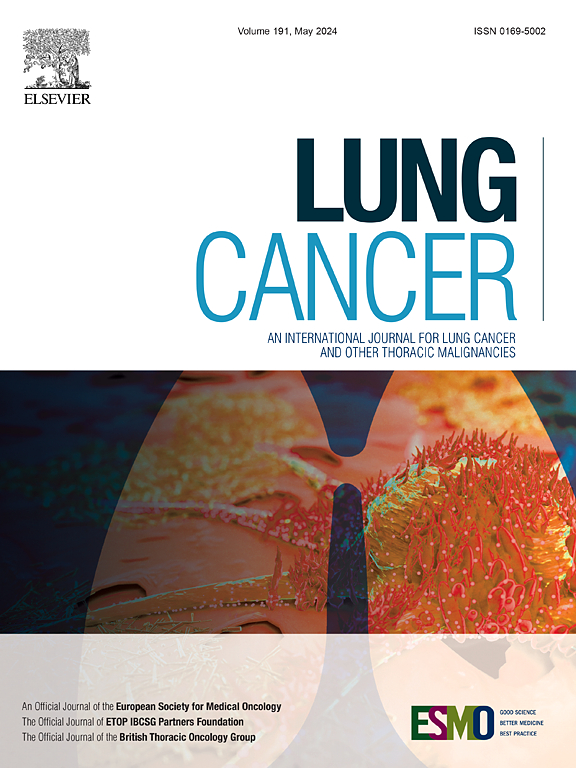The efficacy of continuing osimertinib with platinum pemetrexed chemotherapy upon progression in patients with metastatic non-small cell lung cancer harboring sensitizing EGFR mutations
IF 4.5
2区 医学
Q1 ONCOLOGY
引用次数: 0
Abstract
Introduction
For patients with EGFR mutant NSCLC who progress on osimertinib, the clinical benefit of continuing osimertinib with next line platinum pemetrexed chemotherapy remains unknown.
Methods
In this international, multi-center, retrospective cohort study, a total of 159 patients with EGFR mutant NSCLC who progressed on osimertinib and received platinum-pemetrexed therapy on progression from 2013 to 2023 were included. The data cutoff was December 31, 2023. Data analysis was conducted from January 2024 to June 2024. The primary endpoints were progression free survival (PFS) and overall survival (OS), analyzed using Kaplan-Meier methods. Multivariable Cox regression adjusting for patient-specific and cancer-specific factors was performed.
Results
421 patients with EGFR mutant NSCLC with progression on osimertinib were identified, of which159 patients who met pre-specified inclusion criteria were divided into two groups: Cohort 1 (osimertinib + platinum-pemetrexed) included 50 patients (median [IQR] age, 59 [30 – 83] years; 36 [72.0 %] female; 11 [22.4 %] Asian) and Cohort 2 (platinum-pemetrexed alone) included 109 patients (median [IQR] age, 54 [25 – 80] years; 62 [56.9 %] female; 74 [64.9 %] Asian). Most patients were never smokers (Cohort 1, 37 [74.0 %]; Cohort 2, 66 [60.6 %]). One third of patients had baseline brain metastases (Cohort 1, 19 [38.0 %]; Cohort 2, 36 [38.3 %]). Both cohorts had a median of two prior lines of anti-cancer therapy. The addition of bevacizumab or immune checkpoint inhibitors (ICI) to next-line platinum-pemetrexed chemotherapy was more common in Cohort 2 (bevacizumab use, 30.3 % vs 8.0 %, p = 0.002; ICI use, 33.0 % vs 2.0 %, p = 0.001). With a median duration of follow up of 30 months, there was a significant PFS benefit to continuing osimertinib with next line platinum pemetrexed chemotherapy (9.0 vs 4.5 months; HR 0.49, 95 % CI 0.32 – 0.74, p = 0.0032), also seen in subset analyses of patients who received first line osimertinib (n = 55, 11.0 vs 6.2 months; HR 0.41, 95 % CI 0.25 – 0.73, p = 0.002). Among patients with EGFR mutant NSCLC without brain metastases after progression on osimertinib, we found that continuing osimertinib with next line platinum pemetrexed significantly reduced the median time to CNS progression (n = 38; 7.0 vs 4.1 months; HR 0.47, 95 % CI 0.48 – 0.98, p = 0.01). After adjusted analysis, there was no significant OS difference between Cohorts 1 and 2 (19 months vs 13 months; HR 0.92, 95 % CI 0.60 – 1.39, p = 0.68).
Conclusions and relevance
For patients with EGFR mutant NSCLC who progress on osimertinib, there is a significant PFS, but not OS, benefit to continuing osimertinib with next line platinum pemetrexed chemotherapy. The continuation of osimertinib with next line platinum pemetrexed chemotherapy appears to reduce the risk of CNS progression.
转移性非小细胞肺癌患者携带致敏性EGFR突变后,继续使用奥西替尼联合铂培美曲塞化疗的疗效
对于使用奥西替尼治疗的EGFR突变型NSCLC患者,继续使用奥西替尼与下一线铂培美曲塞化疗的临床获益尚不清楚。方法本研究是一项国际性、多中心、回顾性队列研究,共纳入2013年至2023年159例经奥西替尼治疗进展并接受铂-培美曲塞治疗的EGFR突变型NSCLC患者。数据截止日期为2023年12月31日。数据分析时间为2024年1月至2024年6月。主要终点是无进展生存期(PFS)和总生存期(OS),使用Kaplan-Meier方法进行分析。对患者特异性和癌症特异性因素进行多变量Cox回归校正。结果421例经奥西替尼治疗进展的EGFR突变型NSCLC患者,其中159例符合预先指定的纳入标准,分为两组:队列1(奥西替尼+铂-培美曲塞)包括50例患者(中位[IQR]年龄59[30 - 83]岁;女性36例[72.0%];11例[22.4%]亚洲人)和队列2(单独铂-培美曲塞)包括109例患者(中位[IQR]年龄54[25 - 80]岁;女性62例[56.9%];[64.9%]亚洲人)。大多数患者从不吸烟(队列1,37 [74.0%];队列2,66[60.6%])。三分之一的患者有基线脑转移(队列1,19 [38.0%];队列2,36[38.3%])。两组患者先前接受的抗癌治疗中位数均为两条。贝伐单抗或免疫检查点抑制剂(ICI)在二线铂-培美曲塞化疗中更常见(贝伐单抗使用,30.3% vs 8.0%, p = 0.002;ICI的使用,33.0% vs 2.0%, p = 0.001)。中位随访时间为30个月,继续使用奥西替尼与二线铂培美曲塞化疗有显著的PFS获益(9.0个月vs 4.5个月;HR 0.49, 95% CI 0.32 - 0.74, p = 0.0032),也见于接受一线奥西替尼治疗的患者的亚组分析(n = 55, 11.0 vs 6.2个月;HR 0.41, 95% CI 0.25 - 0.73, p = 0.002)。在接受奥西替尼治疗后无脑转移的EGFR突变NSCLC患者中,我们发现继续使用奥西替尼联合二线铂培美曲塞可显著缩短到中枢神经系统进展的中位时间(n = 38;7.0 vs 4.1个月;HR 0.47, 95% CI 0.48 ~ 0.98, p = 0.01)。经校正分析,第1组和第2组的OS无显著差异(19个月vs 13个月;HR 0.92, 95% CI 0.60 - 1.39, p = 0.68)。结论和相关性对于EGFR突变的NSCLC患者,在奥西替尼的治疗进展中,继续奥西替尼与下一线铂培美曲塞化疗有显著的PFS,而不是OS获益。继续使用奥西替尼与二线铂培美曲塞化疗似乎可以降低中枢神经系统进展的风险。
本文章由计算机程序翻译,如有差异,请以英文原文为准。
求助全文
约1分钟内获得全文
求助全文
来源期刊

Lung Cancer
医学-呼吸系统
CiteScore
9.40
自引率
3.80%
发文量
407
审稿时长
25 days
期刊介绍:
Lung Cancer is an international publication covering the clinical, translational and basic science of malignancies of the lung and chest region.Original research articles, early reports, review articles, editorials and correspondence covering the prevention, epidemiology and etiology, basic biology, pathology, clinical assessment, surgery, chemotherapy, radiotherapy, combined treatment modalities, other treatment modalities and outcomes of lung cancer are welcome.
 求助内容:
求助内容: 应助结果提醒方式:
应助结果提醒方式:


